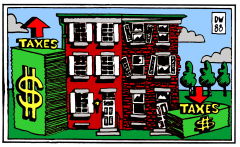AKHIL SAXENA | DECEMBER 3, 2021
In many major American cities, housing affordability has become a pressing issue. In cities like New York and San Francisco, rents have continued to rise over the past decade, leading to increased homelessness and housing insecurity.
https://brownpoliticalreview.org/2021/12/the-perfect-tax-land-value-tax…
In many major American cities, housing affordability has become a pressing issue. In cities like New York and San Francisco, rents have continued to rise over the past decade, leading to increased homelessness and housing insecurity. While many causes have been blamed for this increase, one of the most obvious is the failure of housing supply growth to keep up with population growth, as is the case in New York. Multiple studies confirm that construction of new housing results in decreased rents, suggesting that weak supply growth can result in higher rents. Despite this fact, cities continue to struggle to incentivize the construction of new housing. Exclusionary zoning prohibiting the development of dense housing and anti-development “Not In My Backyard” sentiment, or “NIMBYism,” prevents housing supply from growing adequately to meet demand. Overcoming these obstacles will require city governments to implement strong incentives for new development and increased densification. One possible solution is the implementation of a land value tax, which has the potential to radically transform the incentives around urban land use.
A land value tax, or LVT, has a long theoretical history. The basic idea behind the land value tax is to levy the tax only on the unimproved value of the land, excluding from the taxable value any structures or improvements the owner has built on the land. This feature of the LVT grants it a number of desirable features under standard economic theory. Since the supply of land is more or less fixed, a land value tax creates no economic inefficiency in the form of deadweight loss, in which mutually beneficial transactions do not take place due to the tax. This favorable property of land value taxes was recognized by early economists, including Adam Smith and Henry George, as well as modern economists like Milton Friedman and Joseph Stiglitz. The land value tax can therefore be considered a “perfect tax,” as it is one of the few taxes that does not create deadweight loss. Notably, a standard property tax does not have these features, as a property tax includes the value of improvements on the land and may therefore cause some productive improvements to not be made. This feature makes land value taxation particularly attractive for efficiency reasons, suggesting it could raise revenue and promote economic growth more efficiently than other solutions, such as a property tax.
In addition to its desirable efficiency, land value taxation radically changes the incentives around land use, potentially helping housing-starved cities kickstart new development. The important feature of a LVT is that it is levied on the unimproved value of land, and so can encourage landowners to develop their property in order to gain more profit from it and reduce the relative cost of the tax. An example from the D.C. Policy Center is informative: The owner of a single-family home can increase the value of the property by replacing the single-family home with a duplex or triplex while still paying the same in taxes under a system of land value taxation, reducing the average tax burden per unit. In contrast, under the standard property tax regime, this increased densification would result in a higher property tax burden due to the increased value of the property, and the landowner may decide not to undertake this improvement. In this way land value taxation can increase housing supply and drive new development. Land value taxation could also potentially help neutralize the effect of NIMBYism. One of the major drivers of NIMBYism is the concern that new development will reduce the value of local homeowners’ land. A land value tax could reduce local homeowners’ investment in maintaining the value of their land, reducing their opposition to new development and allowing the housing supply to grow with fewer constraints.
"In addition to its desirable efficiency, land value taxation radically changes the incentives around land use, potentially helping housing-starved cities kickstart new development."
Despite the positive properties of land value taxation, there are still numerous challenges to its implementation. The biggest challenge is how to assess the unimproved value of land, a major reason why more cities have not implemented a land value tax. While it is possible to easily determine the value of property based on the value at the last sale, it is more difficult to use this approach to separate the value of land from that of improvements. However, there are several methods that could potentially provide an accurate estimate of the unimproved value of land, including using nearby vacant lots as a comparison. Using these techniques can allow government agencies to produce appraisals of land value, similar to how they currently produce property tax appraisals. Another challenge to the implementation of land value taxation could be homeowners who may resist taxes on their land. However, land value taxation is arguably more favorable to homeowners than a property tax, since it excludes the value of improvements. The introduction of a land value tax coupled with a decrease in the property tax could assuage homeowner concerns while also allowing local governments to gain a new source of revenue. One estimate finds that a 2 percent tax on the value of land could fully replace the property tax in D.C. while shifting the tax burden onto highly valued but underdeveloped properties, funding city expenditures while encouraging development.
Land value taxation offers city governments the opportunity to encourage new housing construction and increased density while simultaneously raising revenue without incurring economic inefficiency—a win-win for city governments faced with shrinking revenues and soaring rents. Implementing a land value tax can therefore serve as a critical tool in the fight against housing shortages, and has the potential to transform urban land use.

